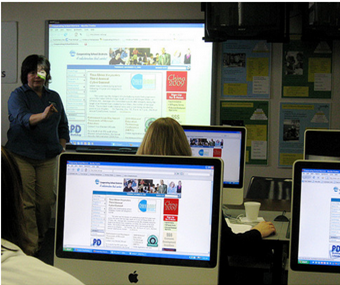Name something you use every day. There are a variety of responses that could come from this question, but for many teenagers, daily phone use is the norm. Many of those teens have iPhones. Did you know that the first iPhone was released in 2007? Can you imagine going a day, or a lifetime, even, without your cell phone? It would definitely take some adjustment.
Technology is all around you, especially at school. Students go on Moodle to keep up with assignments, log on to Socrative to take quizzes, write answers to questions on the classroom SmartBoard, and teachers can check papers for plagiarism on turnitin.com. Even now, I typed this story on a laptop. But can you imagine what it would be like if all that technology… went away?
No more laptops, no more SmartBoards, no more HAC, just to name a few. You couldn’t check your grades or look up information for your research project online. You would research using books and write your essay out by hand. This is what life was like up until a few years ago. The world wide web was invented in 1989. In 1994, only three percent of classrooms had internet access. By 2004, ninety-four percent of classrooms had internet access. Many modern students store their files on flash drives, which were invented only fifteen years ago . The SmartBoard was released in 1991, and now, more than twenty years later, SmartBoards are a common sight in LHS classrooms. All three of these technologies have been refined over the years. For example, the internet in the nineties would be painfully slow for the generation that was raised in this technological world. Technology is growing exponentially, whether we like it or not. Chrissy Guy, Special Education Department Chair at Leonardtown Elementary School, remembers what teaching was like before all of this new technology. Guy said of her teaching experience, “When I first started teaching in 1990, I had one Apple IIe computer in my classroom. Information from word processors was stored on floppy disks… There was no internet/email/web access for the school system at this time. In fact, worksheets/handouts for students were hand-written and copied on a copy machine or ditto machine.” However, Mrs. Guy enjoys being able to use new technology in her classroom. “Because of new technology, my overall teaching experience has been enriched. Almost all of what I do as a teacher has some sort of “link” to technology…Technology provides me with more flexibility in how I reach the needs of different students who have different learning styles and learning preferences.” Mrs. Guy also noted that “ technology increases communication between home and school through email, texting, and HAC communications”.
Another example of the increasing use of technology in schools is the PARCC test. At the end of the 2014-2015 school year, the PARCC test, which will eventually replace the HSA’s, is slated to be given to students as an online test. The PARCC test aligns with the new Common Core Curriculum, which is the new national curriculum that forty-six states have adopted so far.
Along with technology comes controversy. Although technology has its benefits, it also has its drawbacks. Here are some points to think about: Students can look up questions on the internet and get answers in seconds; is this a good thing because students can receive and therefore learn information more quickly, or is it a bad thing because it makes it easier to cheat on tests? Should cell phones be allowed at school? It gives parents peace of mind to know that their child can contact them in case of an emergency, but most teachers see cellular phones as a source of distraction for their students. Does allowing technology use at school leave students more vulnerable to cyberbullying? There are many questions to consider when looking at the overall pros and cons of classroom technology use.
The growing use of technology in schools will continue to be controversial, but as the years go by, the use of technology is becoming more common and prevalent in all areas of our everyday lives. And who knows what currently undeveloped technology will become widespread in the future?








